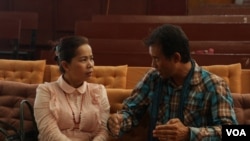Born into a family steeped in the classical arts in Prey Veng province, Him Savy, a fine arts professor, will be one of nine performers to take part in the Bangsokol Project, a performance fusing music, voice, movement and visuals put together by some of Cambodia’s top artists.
Savy, 44, says her personal sorrow at the loss suffered under the Khmer Rouge regime meant the new performance, “Bangsokol: A Requiem for Cambodia”, which will begin later this year, is of deep personal significance.
“It is really emotional for me to think of that and I just cannot imagine which my dad looked like, how and where he died,” said Savy, who was separated from her father by the regime at five years old.
“Sometimes, I almost cry on stage. Although the audience cries, I can not cry. If I cry, I would not be able to continue singing and performing on the stage,” she added.
The first performance of Bangsokol will take place in Australia in October, followed by showings in the United States in December, France in May and lastly Cambodia in 2019 to mark the 40th anniversary of the fall of the Khmer Rouge.
Bangsokol was commissioned by Cambodian Living Arts (CLA), an NGO that aims to support the revival of traditional art forms, in partnership with AMRITA and the Bophana Center, with additional support from the Australian and U.S. embassies.
Prim Phloeun, head of CLA, said the project was dedicated to the victims of the regime. “Bangsokol ... is about art, the mixture of traditional dance and film related to the Khmer Rouge,” Phloeun said.
Rithy Panh, founder of the Bophana Center and one of Bangsokol’s directors, said the project was “a vital act of memory.”
“It is an attempt to give dignity to the dead, to reconcile with our own past, to give a face and a name to the victims; to give their souls peace,” he added.
In Khmer, Bangsokol refers to a Buddhist ceremony that accompanies Cambodian funeral rites aiding the spirits of the dead into the next life.
Despite its focus on the harsh reality of the Khmer Rouge, Bangsokol is not intended to leave audiences saddened, says Him Sophy, one of the composers.
“It is not only dedicated to the dead, but also to encourage the survivors to keep having hope,” Sophy said, explaining that the use of traditional Chai Yam dance in the performance was intended to show that the survivors were the future of the country.
Panh said the performance did not conclude with a sad ending. “We do not end Bangsokol with a sad plot, but with the optimistic message to the next generations that asks them not to keep moaning but always believe that there is always something new for them.”
Phloeun of CLA said that the Cambodian performances had been pushed back to 2019 because of a lack of Cambodians able to play modern classical music and funding issues. “In Cambodia, support for new arts performances is still limited.”
Savy said that despite not being an expert singer, she had taken on the challenge and trained hard. “I practice even when I am in the car. I listen to my teacher’s songs and I follow along.”
Chhang Youk, executive director of the Documentation Center of Cambodia, said any attempt to heal the wounds of the Khmer Rouge survivors must be encouraged.
“A nation that has been through genocide such as Cambodia can come to terms with forgiving without forgetting. Forgetting does more harm than healing, both as a society and individuals,” he said.









